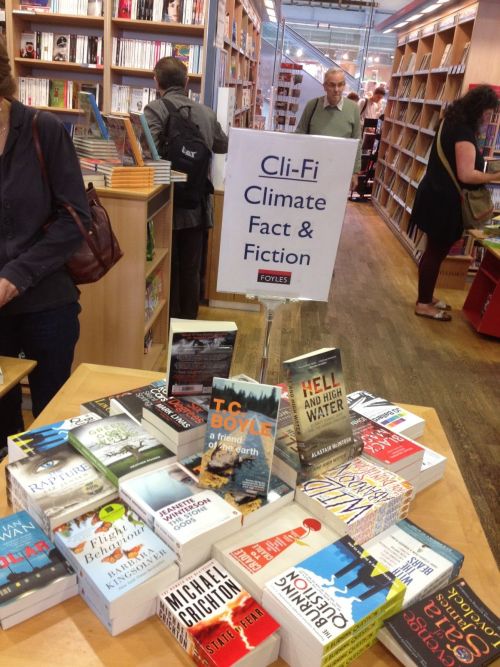
Mark Nykanen, author of Primitive, Carry the Flame, and other environmentally themed novels, and Mary Sands Woodbury, editor at Moon Willow Press and the website Clifibooks.com, offered their thoughts on climate fiction and its future in publishing. (Material is edited.)
What is “climate fiction,” and is it a new genre of fiction?
Nykanen: I like “climate fiction” as a separate category of fiction entirely. I don’t think it works as a sub-genre of sci-fi. Cli-fi can have roots in sci-fi, of course, but also in thrillers and literary fiction. Right now there’s a fuzziness about cli-fi, though the term is clearly gaining traction. But I also think sales will dictate whether cli-fi gains a sharper profile.
Woodbury: Climate fiction is fiction related to climate change, usually anthropogenic. It’s a genre by itself but can overlap with speculative, literary, and science fiction. And even though it’s new, some critics call the very term “climate change” a tired trope, and some climate change authors might not even totally identify with the genre (yet), seeing it more as a motif than a genre.
What are the main themes of climate fiction?
Nykanen: Destruction of the human species is the dominant theme of cli-fi. Related to that, naturally (yes, pun intended), is the destruction of the environment in which we, as a species, have flourished. From there, authors take it to various fictional domains–dystopia, apocalypse, post-apocalypse. I haven’t seen much cli-fi emphasizing adaption.
Woodbury: I’ve seen a little bit of everything, including light-hearted parody. Climate fiction is really mostly about the ways humans react to conditions we find ourselves in, in this case in a world in which long-term climate patterns are changing. It is not always pessimistic in the sense that if something bad happens, total doom and gloom will follow—more like, how do humans deal with not just climate change effects but fellow problems such as quick resource grabs, over-fishing, and freshwater reduction?
Who are the authors defining climate fiction today?
Nykanen: I’m hard-pressed to name the leading authors of cli-fi. While I’ve certainly read a fair number of them, I read far more literary fiction than anything else, so of course Margaret Atwood‘s work comes to mind right away. Ditto, Barbara Kingsolver.
Woodbury: I am not sure that any one book or author has defined the genre, though Margaret Atwood, Ian McEwan, Barbara Kingsolver, and Nathaniel Rich are often listed in climate change articles in the media. Lesser-known authors, such as Clara Hume, whose Back to the Garden mirrored some of Daniel Quinn‘s philosophies, and Peter Heller, whose The Dog Stars didn’t even mention climate change, are also starting to get some recognition.
Will we see a climate fiction shelf in bookstores?
Nykanen: I’m not sure we’re going to see bookstores in ten years, so hazarding a guess about a “shelf” for cli-fi should be seen metaphorically. While I’d like to see a clear category of cli-fi, I’m not too sanguine about that. I think cli-fi takes on a subject that is deeply uncomfortable for people, who are caught in a classic case of cognitive dissonance: Those who accept climate change and are knowledgeable about it recognize that it calls for wholesale changes in their lifestyles, which most–to judge by the record–cannot accept. So what do they do? They turn away from dealing with it as much as possible, and that, alas, includes reading about the subject. For those who view reading fiction as an escape, cli-fi provides little comfort.
Woodbury: Already, Goodreads, Smashwords, and Amazon recognize the genre. Media such as The New Yorker, NPR, The Guardian, and The Christian Science Monitor have recently reported the new genre. The question for libraries and bookstores is a taxonomical one: climate fiction overlaps with other fiction, and if it claims its own genre it will not be a sub-genre but will occupy other genres laterally. Climate change novels are easier to catalog in digital systems, with metadata, but it would be great if the genre found its own physical bookshelf.
Will climate fiction affect the debate on climate change?
Nykanen: I think cli-fi has the potential to sway popular views about the looming disaster, but I don’t believe that’s likely to happen unless literary efforts are adapted to film or television. I think the more adventuresome TV that we’ve been watching for the past decade would be the best medium for reaching and, perhaps, even convincing large numbers of people.
Woodbury: The New York Times asked this question of Professor Annie Merrill Ingram, who said, referencing Rachel Carson‘s 1962 nonfiction book, “We don’t yet have a Silent Spring of climate change. We don’t yet have that galvanizing work.” I think part of the reason we haven’t seen this yet is because Carson’s book was nonfiction and dealt with something easier to grasp: the effect of pesticides. Not only is climate change large and overwhelming, but it is tied with a slew of potential environmental, economical, and political issues that would be quite difficult to cover in a novel. [But] the books are here. The genre is here. We’re ready. Mainstream media isn’t picking it up in totality just yet. That’s what we want to change, and part of why clifibooks.com exists.
What do you think? Will climate fiction change the world?

Tell Me What You Think!